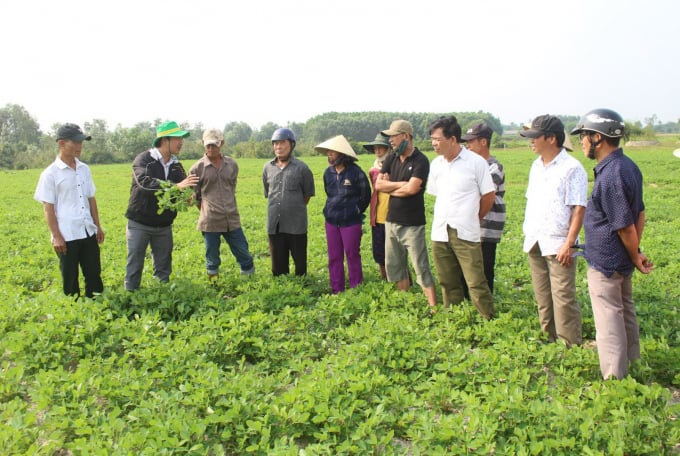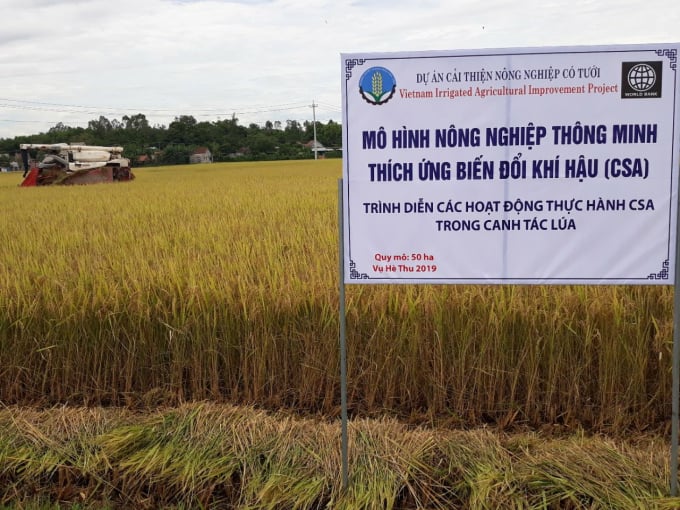May 29, 2025 | 20:23 GMT +7
May 29, 2025 | 20:23 GMT +7
Hotline: 0913.378.918
May 29, 2025 | 20:23 GMT +7
Hotline: 0913.378.918
The Vietnam Irrigated Agriculture Improvement Project (VIAIP/WB7) is supported by the World Bank with a total fund of US$210 million including a concessional loan of US$ 180 million and US$30 million as the counterpart fund of the Government of Vietnam. The project has been implemented since 2014. By June 2021, all approved contents and activities of the project were completed.

Peanuts are grown under the climate-smart agriculture model in Thanh An Commune, Cam Lo District, Quang Tri Province. Photo: Le Khanh.
The project has four components with Component 1: Support to improve irrigation management ($9.5 million); Component 2: Upgrading irrigation system ($170.5 million); Component 3: Supporting smart agricultural practices to adapt to climate change ($23 million) and Component 4: Project management, monitoring and evaluation ($7 million).
The objective of Component 3 is based on improved irrigation infrastructure in Component 2 of the Project, smart agricultural practices adapted to climate change to improve productivity and quality of agricultural production, increase the efficiency of water use, increase farmers' income and reduce vulnerability to adverse climate changes, reduce greenhouse gas emissions, thereby drawing lessons from experience to expand throughout the project area and the whole country.
In Component 3, smart agricultural practice models were built to adapt to climate change. The models were then expanded in the project area. Measures to minimize water consumption and environmental impacts of rice farming systems were implemented. The modernization through the use of sprinkler and drip irrigation systems was promoted.
Component 3 also offered training for farmers and supports to the Ministry of Agriculture and Rural Development to upgrade the information dissemination system on smart agriculture adapting to climate change.

The Vietnam Irrigated Agriculture Project not only helped farmers reduce production costs, increase profits, but also approach and change their perception of production towards sustainability.Photo: Le Khanh.
When implementing the project, provinces such as Ha Giang and Hoa Binh still have many limitations as the model is located outside the area of Component 2 because most of the irrigation systems of Component 2 are small in scale, with a small irrigation area, mainly serving rice cultivation, while the climate change adaptive smart agriculture model focuses on fruit trees.
Technically, through monitoring and summarizing, it can be seen that the factors contributing to the effectiveness of the models include saving water for irrigation by reducing the number of watering times, reducing the amount of irrigation water, reducing the amount of seed used, reducing the amount of water used for irrigation, reducing fertilisers and pesticides.
Among rice production models, those for rice production in large areas and models that converted rice land to growing vegetables generated the highest technical efficiency in terms of reducing watering and the seeds, using slow-release fertilisers, reducing the number of times of spraying pesticides, using microbial organic fertilisers and reducing greenhouse gas emissions from 4.3 - 4.42 tons of CO2/ha/year.
In particular, the model of rotating rice with other crops has the highest pesticide efficiency, and the number of times of pesticide application on crops is reduced from 3 to 6 times/crop compared to conventional farming.
According to Deputy Minister of Agriculture and Rural Development Le Quoc Doanh, the Vietnam Irrigated Agriculture Improvement Project was the first project between the ministry and the World Bank (WB) to integrate irrigation infrastructure with smart agricultural models for multi-values and higher investment efficiency.
The project not only maximized the efficiency of investment in irrigation works but also contributed to the realisation of policies and guidelines of the agricultural restructuring towards sustainability, adaptation to climate change with the Irrigation Development Strategy to 2030 and a vision to 2050.
In Quang Nam Province, the implementation of models of the Irrigated Agriculture Improvement Project shows that applying the sowing method with quality seeds in the rice model reduced by about 30 kg of seed per ha compared with the fields outside the model. Rice plants grow healthy with a reduction in costs, care and fewer pests and diseases.
In the more, pesticide spraying reduced 2.5 times per crop, water was saved 2.7 times compared to the control field. The use of organic fertilizers helped reduce 29.5 kg of urea/ha compared to the field outside the model. The model helped increase by VND7 million/ha/crop compared to the old farming.
In vegetable growing models, mainly peanuts, as farmers applied the IPM model with the use of new varieties and organic fertilisers, pesticide spraying was reduced two times. The average yield of the model is 3.3 quintals/ha higher, the profit is VND10.3 million/ha higher than the field outside the model.
Translated by Hien Anh
/2025/05/25/4127-3-073637_820.jpg)
(VAN) Thanks to the promotion from an FAO-implemented project, vegetable production in greenhouses in Moc Chau has seen strong development, from 1.5 hectares in 2021 to nearly 50 hectares in 2024.

(VAN) FAO has recently supported USD 140,000 to implement the project 'Risk mitigation human-animal interface risks through disease control initiatives in pig farming.'

(VAN) The People's Committee of Tra Vinh province has approved an adjustment to the investment policy for the Green Hydrogen Plant project, increasing its area to approximately 52.76 hectares.
![Reducing emissions from rice fields: [2] Farmers’ commitment to the soil](https://t.ex-cdn.com/nongnghiepmoitruong.vn/608w/files/news/2025/05/05/dsc08881jpg-nongnghiep-140632.jpg)
(VAN) Clean rice cultivation model in Thuong Tan commune, Bac Tan Uyen district, is assisting local residents in achieving sustainable agriculture by substantially reducing costs, increasing productivity, and protecting the environment.

(VAN) At the conference to disseminate Resolution No. 68, AgriS introduced its digital agricultural ecosystem and reaffirmed its commitment to accompanying the Government in promoting private sector development and sustainable agriculture.

(VAN) 'Blue Ocean - Blue Foods' initiative is designed to restore marine ecosystems and establish sustainable livelihoods for local communities by cultivating a minimum of 1,000 hectares of cottonii seaweed in the first three years.
/2025/05/21/4642-3-112707_603.jpg)
(VAN) The V-SCOPE project has made direct contributions to three out of six pillars of the Comprehensive Strategic Partnership between Vietnam and Australia.